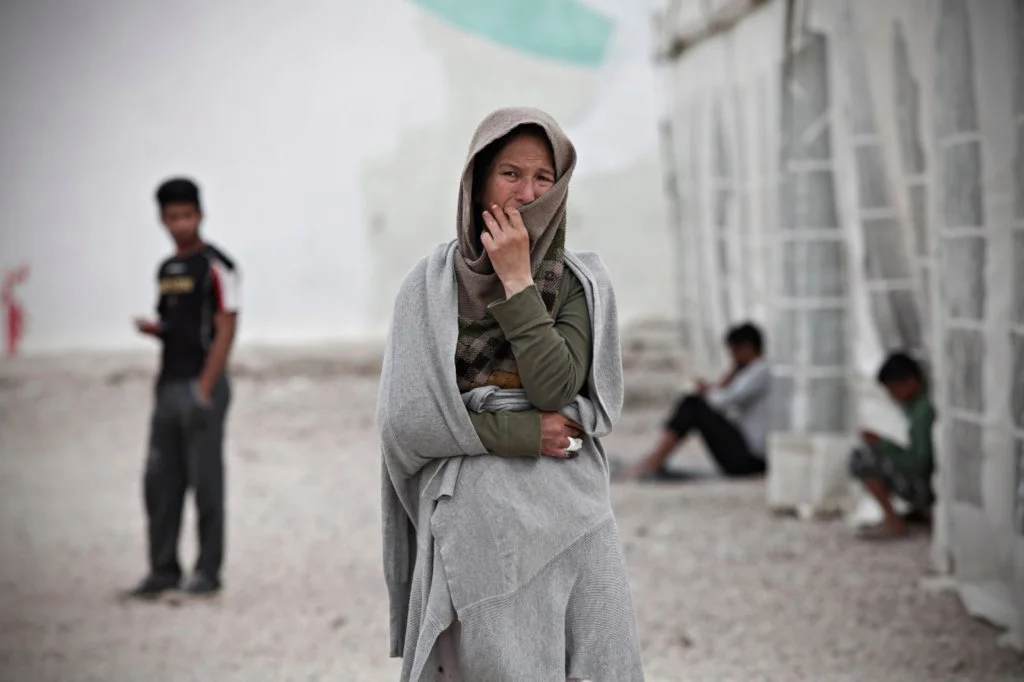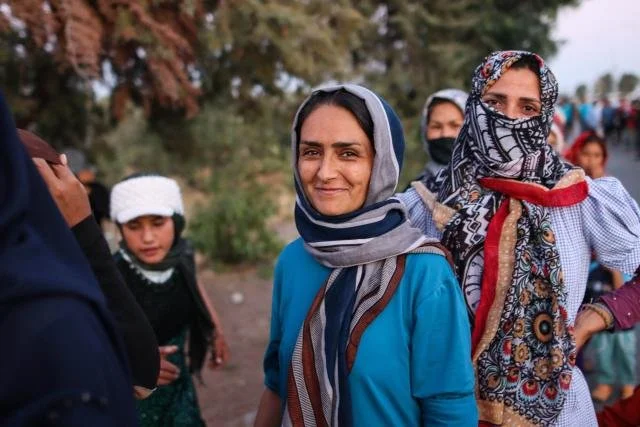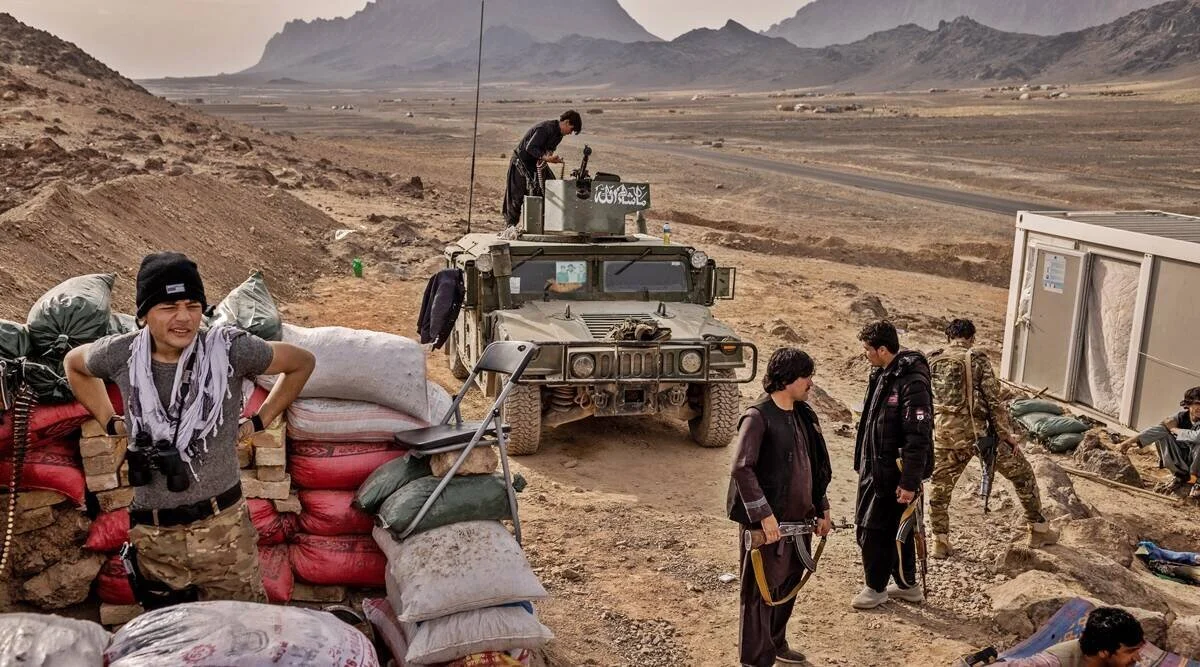The Asia-Pacific News Update expands on the Afghanistan News Update, providing updates, resources, and analysis on U.S. imperialism across the regions—from the Philippines, Korea and Hawai’i to Palestine, Iran and Afghanistan. With each edition, we aim to strengthen the public’s awareness and understanding of U.S.-led militarization across Asia and the Pacific, while mobilizing support for regional struggles against the U.S./EU/NATO Axis of Domination.
In March 2025, Syria witnessed horrific sectarian massacres by government-backed forces targeting Alawites in the country’s northwest coastal regions. Since the violent takeover of the Syrian government by Hay’at Tahrir al-Sham (HTS) in November/December 2024, nearly 8,000 people, mostly civilians, have been killed.
HTS, far from being an independent actor, functions as a proxy force advancing the geopolitical interests of the United States, Israel, and their allies, whose primary goal is to destabilize the region and maintain control over its resources. Damascus governor Maher Marwan indicates that HTS wants peace with Israel, while Israel’s destruction of Syria’s armed forces and anti-air defenses after HTS’s takeover of Damascus has elicited seemingly no criticism, let alone an armed response from Syria’s new rulers
On May 21, BAP’s Asia-Pacific Team conducted this interview with Max Ajl to discuss what anti-imperialist organizers can learn from the case of Syria. Ajl is a scholar at MECAM/University of Tunis and the Tunisian Observatory for Food Sovereignty and the Environment (OSAE). The following interview has been edited for length and clarity.
Asia-Pacific News Update: How is the propaganda around regime change in Syria still effective? How can we inoculate radical movements in the West from the kind of propaganda that enabled the Syria regime change operation?
Max Ajl: The fundamental issue is that most people, even people who are critics of what is currently occurring in Syria, maintain an unanalyzed or underanalyzed sense of what it means when people claim that Syria had an organic uprising or a suppressed, mass-based, or liberatory revolution – this, before we even get to the “opposition” and its violence, which was present from the beginning.
There’s a myth about what happened in Syria from 2011-14, or even later. Although I disagree with a lot of Bassam Haddad’s approach, he wrote an article about this for The Nation, about the conflicting narratives about the Syrian uprising, and these narratives that become ironclad mechanisms through which people need to see the world. So, of course, there were people who “rose up” in Syria – and maybe they used words like “freedom”, and maybe they also used words like “justice.” What is that telling us? Yes, people thought they were fighting for justice, but we need to know a lot more. And this process of critical scrutiny includes: Who were these people who were rising up? How much of the population did they represent?
Where did they come from? Also, what were their actual aspirations? What was justice filled with? Who were they linked to? What external forces were they warm to and what were they cold to? And what was the role of violence? These are blocked from the entire discourse, so the model of a Syrian regime change can remain easily re-implementable in other sovereign states, because the way that the operation worked remains opaque.
But there have been several fundamental things that have been publicly documented. From 2005 onwards, USAID and the NED were very active in Syria, promoting notions of liberalism and democracy against the reigning Syrian government – which had extreme democratic deficits. And they were selling this to young people, and then many of these young people then participated in the 2011 protests and said “Yes, we are fighting for freedom and democracy,” which of course is very appealing to a western audience who believe that these are meaningful categories – these are fundamental governing myths of our own system.
Many of these people were then equipped with all sorts of radios and other communication equipment to film certain types of repressive acts, which did occur without any question, to create a media discourse which was then beamed worldwide by the western media but also by the Qatari media, that said there is a popular revolution for freedom and democracy that is being violently repressed. But the historical reality had so many other facets that were removed and ground down so we could only see one facet.
Such as: who else was mobilizing alongside these liberal young people?
One, there was a lot of sectarianism, it was well known, there was an extreme level of sectarianism, anti-Alawi, anti-Christian. This was suppressed. And the liberals more or less thought that they could ride the wave of an agitation with a certain degree of sectarianism and use it to implement a form of liberal democracy. Others in the local coordination committees thought that the US would do what it had done to Libya and just use immense air violence against the military in Syria and take out the state. There were people who definitely thought that.
Overwhelmingly amongst the liberals and the sectarians, there was not a principled opposition to foreign intervention in Syria. That was a very minority position amongst the people who partook in these protests. What’s also missing is that every society has discontent. Discontent is a normalized aspect of social and political life. Any social formation is going to produce political discontent. Yet, discontent is widely understood in the Arab-Iranian region as something that means: “get rid of the existing regime,” which then creates a zero-sum competition for power. And if one of those sides is backed by the US, that’s the very definition of imperialism – you can find Biden saying that the Saudis and the Qataris were pouring in money, and you can find the former Qatari foreign minister saying “Yes, we poured in billions of dollars to accomplish regime change in Syria.” He openly admits it, and others have openly admitted that US Special Forces were on the ground, “filtering” weapons from Turkey to make sure they went to the appropriate destinations.
Furthermore, the violence itself started already in March 2011, with attacks on civilian buses, police stations, snipers shooting into crowds, and even massacres of security forces. All of this is erased through the nice notion of a “peaceful revolution,” which only reluctantly and defensively militarized. In fact, this narrative is simply incorrect.
Asia-Pacific News Update: It seems that you have to be agnostic on the question of imperialism to be able to believe the narrative that this was a liberation struggle. Is there a prerequisite of understanding imperialism and how it works before you can really understand what’s going on in Syria?
Max Ajl: Or you understand, to be very crude about it, that if the US is involved in another country, it is for the worse. In fact, the uprising’s partisans call this a very crude framework. And I say “yes, let us start with a crude tool.” Sometimes a crude tool is very effective. A hammer, in fact, is a crude tool, but it’s very effective for driving a nail in. And for building opposition to the US, for people North and South. For building a common front against the violence that the US inflicts in the world, a crude and very appropriate tool is a hardline, unrelenting, black and white opposition to the project of US power.
Asia-Pacific News Update: Can we learn something about US imperialism through the example of what’s happened in Syria over the past 10 years, or even since November/December 2024? Is this a case study that can help inform our understanding about what the US is doing around the world, whether in Africa or domestically?
Max Ajl: Paris Yeros wrote about this in the context of Mozambique, that in the current moment of widespread post-Soviet ideological confusion, widespread lack of organizing cadres that have helped people orient politically to the world, and the widespread destructuring of peripheral social formations such that you have systemic semi-proletarianization, you have a lot of people who are confused about the world they live in, which is legitimate.
There are accordingly widespread bases for the US to implement these so-called democracy-promotion projects that are based on alleging, inciting, or even the actuality of unrest within states that are still emerging from the anticolonial struggles, and then observing that those states often respond to unrest with violence and the US can try to weaponize that unrest to burn down and destabilize the country, impose sanctions and so forth. We’ve seen this happen in Libya; the US is constantly trying to do this in Iran; the US did it in Syria; the US tried to do it to some extent in Lebanon, which remains under severe financial siege and Hezbollah remains severely embattled. It happened in Mozambique, in Zimbabwe through the urban trade unions and their associated western-funded civil society, strongly supported by western academics and so forth.
People don’t understand that war is actually the method of accumulation by the US. The US encourages war. So much of the profit of the US involves the subjugation of Third World social formations and the instilling of a sense of defeat, and this is how the US is able—with a not-very-large portion of world global productive capacity—to maintain such a large share of global wealth, precisely because it intimidates and clobbers the rest of the world, and war is part of that.
The technologies of militarization that are developed through co-production between the US and Israel, for example, are then deployed in the United States. The counterinsurgency that’s been tested against the Palestinian people is then used against people here. There’s a lot of work — for example, Tip of the Spear, the recent book about how there’s this kind of war that the US state apparatus is engaged in; counterinsurgency against racialized populations in terms of preventing the coalescing of political projects. So, I don’t think it’s a coincidence, for example, that the most policed and repressed of the popular movements have always been those forces identifying as national or national liberation struggles – in Black, Puerto Rican, and Indigenous communities.
Asia-Pacific News Update: What is the task for anti-imperialists in the west? It sounds like the task is really to continue educating people about the devastating impacts of sanctions.
Max Ajl: We need to educate people about sanctions, about the terror lists; we need to clarify the mechanisms of contemporary hybrid, asymmetrical warfare; how it’s operating through the media; what are the types of narratives the US uses; what weaknesses it's exploiting in peripheral states. We need to know all of that. We need to educate ourselves. We need this knowledge to know where to go. And this was basic from Cabral, also. Cabral’s like a lodestar. He said, “No, there’s never been a successful revolution without a revolutionary theory.” A theory is knowledge, it’s abstraction, it’s identifying the relationship between concepts and a map of historical reality. So, we need to educate ourselves to move politically in an effective way.
Asia-Pacific News Update: Is there some sobering lesson here for countries like Iran, Russia, or China?
Max Ajl: First, there’s much more bilateral trade occurring on a world scale, settled in non-US currencies, and it’s only going to escalate. Two, every time China is sanctioned, it moves to do what is called an import substitution process: it actually has to produce that industrial process domestically, and that’s what it’s doing with microchips right now. So, I think it’s always been understood by the Russians, Chinese and Iranians, but now it’s acutely understood that you need to have national sovereignty over technology; that you need a sovereign industrialization; this is so clear to everyone.
Asia-Pacific News Update: For Syria, do you envision a Libya scenario with years of continuous civil war and state collapse?
Max Ajl: I don’t want to say something false; the situation in Syria is disastrous. I hope they get out of it, but the Syrian people are exhausted by sanctions and war. I don’t think they apportion blame correctly, but they’re exhausted and it’s going to be a very long struggle.






























